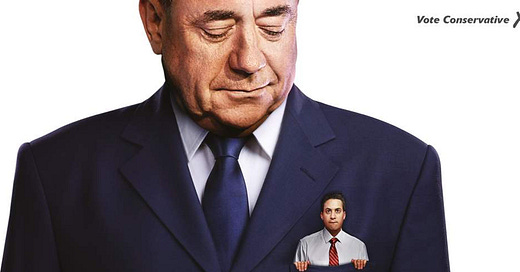The narrative shifted just as expected following the local elections. We moved sharply from “Sunak comeback” to “Labour is not on track for a majority”. The Tory-friendly media, unable to sustain the position that the Conservatives might win another term, returned to the “coalition of chaos” concept that they used in 2015 against Ed Miliband.
The Mail on Sunday, never overly worried about subtlety, blared: “The nightmare is looming of Starmer as a marionette PM dancing a maniacal jig to the tune played by an unholy alliance of Scottish Nats and Corbynites”. The Sun went for: “Labour and Lib Dems hint at ‘dirty’ backroom deal to install Sir Keir Starmer as PM in coalition of chaos”. Not to be outdone the Telegraph told us: “The spectre of a Labour ‘coalition of chaos’ is once again haunting Westminster. It will terrify voters.”
In last week’s post I explained why it’s a misreading of the local election results to think they showed that a hung parliament is likely, despite Labour’s 16 point national poll lead. By far the most important takeaway was the increased efficiency of Labour and Lib Dem votes which spells deep trouble for the Tories. (See for instance this bit of data analysis from Lewis Baston, this post from Ben Ansell, this one from Ben Walker, and this from Stephen Fisher).
But it is clearly true that a hung parliament is a possibility and will likely be seen as such right up to election day. So we can expect a lot more “coalition of chaos” and a lot more questioning of Labour, Lib Dem and SNP spokespeople as to what deals they would be prepared to do and so forth. Opponents of the Conservatives will no doubt be exasperated by this and Labour politicians sorely tempted to say something along the lines of: “You’re worried about us causing chaos? Have you been awake for the last seven years?”
Most unaligned voters, though, only engage with politics occasionally and tend to be forward looking. In 2019 they saw a choice between resolving Brexit quickly with the deal on the table or more rounds of Parliamentary incoherence, and chose resolution, even though the Tories had been in power for the previous few years of turmoil.
Given this it’s worth understanding the electoral potency of the “coalition of chaos” claim, and what role it will play in the run up to the election. Was it really important to the surprise Conservative victory in 2015? How will the argument run this time? Could it backfire?
Keep reading with a 7-day free trial
Subscribe to Comment is Freed to keep reading this post and get 7 days of free access to the full post archives.




